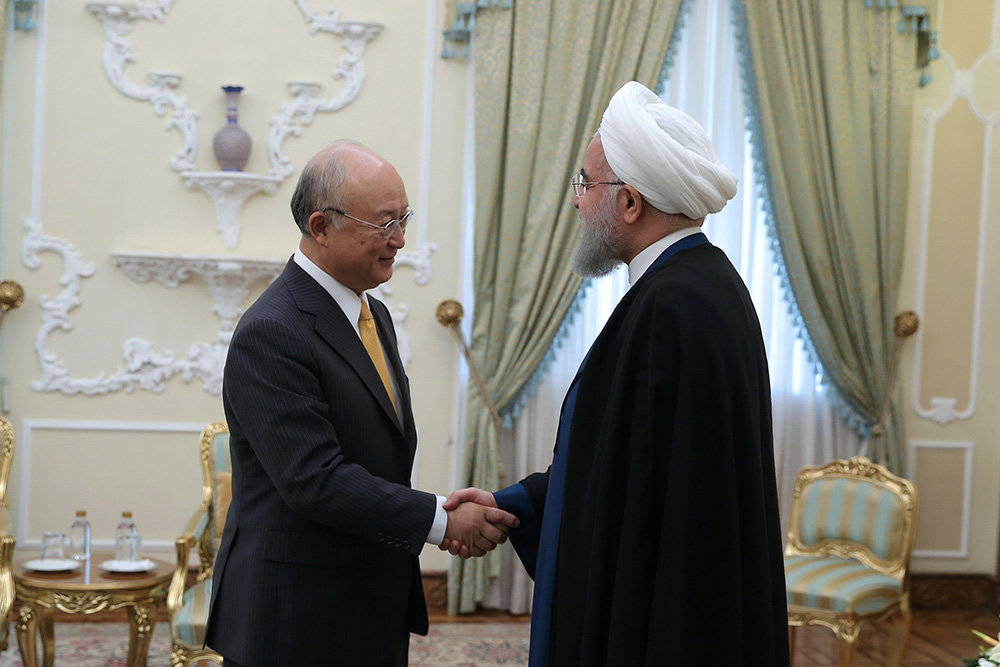Amano: Commitment by all sides crucial to JCPOA survival

TEHRAN – Yukiya Amano, director general of the International Atomic Energy Agency, said on Sunday that if the only nuclear deal - formally called the JCPOA - is to survive it is “crucial” that all sides abide by their commitments.
"Fulfilling commitments and obligations by all parties is crucial for stability and the future of the JCPOA," Amano said at a meeting with Iranian President Hassan Rouhani in Tehran on Sunday.
The UN nuclear watchdog chief again reaffirmed that Tehran has remained fully committed to its obligation under the landmark deal.
"Today, based on the joint efforts that have been made, we can emphasize that the Islamic Republic of Iran has lived up to all its obligations under international regulations and the JCPOA," Amano explained.
According to the JCPOA, the IAEA is tasked to monitor restrictions on Iran’s nuclear program in exchange for termination of economic and financial sanctions.
The IAEA chief also stressed that most of the world's top authorities are fully supporting the JCPOA.
Amano said his agency is impartial in monitoring countries’ nuclear activities, saying the credibility of the international body is dependent on this principle. "The credibility of the Agency is very important, and it continues to maintain its impartiality in its stances, and it will present real reports based on facts and safeguards."
In a report posted on the IAEA website it was said that Amano “reiterated that the nuclear-related commitments undertaken by Iran are being implemented, and that the JCPOA represents a clear gain from a verification point of view.”
“The IAEA’s verification and monitoring activities are conducted in an impartial and objective manner and in accordance with the modalities defined by the JCPOA and standard safeguards practice,” it said.
Rouhani says Iran firm to have long-term co-op with IAEA
Rouhani, for his part, emphasized the need to maintain the “independence” and “impartiality” of the IAEA, stating that the Agency is the only authority to verify Iran's adherence to the JCPOA.
"The Joint Comprehensive Plan of Action (JCPOA) has clear criteria, and Iran acts merely based on those criteria,” Rouhani pointed out.
The president said that his country is ready to develop cooperation with IAEA within the framework of Agency's safeguards agreement, international regulations and the JCPOA.
“We are determined to have long-term cooperation with the Agency within the framework of international regulations, and we hope, given the full cooperation of Iran in recent years, that the Agency announce, as soon as possible, the final report on the peaceful nature of Iran's nuclear program.”
Rouhani also said that Tehran expects the IAEA to provide assistance to Iran like it does to other countries that are committed to safeguards agreement and the NPT in various nuclear fields applicable in agriculture, medicine based on its duties.
Rouhani also referred to the United States’ approach to the JCPOA, saying, “Stability of international regulations and treaties is very important.”
A country cannot deal with multilateral and international agreements as it wishes, he emphasized.
The president went on to say that Iran will never be the first country to exit the JCPOA, noting, “We will adhere to the JCPOA until the time we are able to gain benefits stated in it.”
The president noted that the credibility of the IAEA as an important international body is dependent on carrying out its professional and technical activities without being affected by some countries.
“If some countries and their authorities attempt to influence the Agency's decisions and put it under pressure, it will not be acceptable to us".
Stating that cooperation between Iran and the IAEA should step up confidence of the two sides, Rouhani said, “We should not allow the JCPOA, as an important achievement, to be undermined, and we must consolidate this important international commitment with full cooperation.”
Salehi: Section T does not include special inspections
Earlier the day, Amano met with Ali Akbar Salehi, the vice president and director of the Atomic Energy Organization of Iran.
During a press conference following the meeting, Salehi said that he had exchanged views with Amano about Section T of the JCPOA, which deals with the technology that could contribute to the development of a nuclear explosive device.
Iran’s nuclear chief stressed that Section T does not include special inspections, but the opposite side (the U.S.) is making its own special interpretation of the provision.
Salehi, a nuclear physicist who also represented Iran at the Vienna-based IAEA for some years, also said Iran can enrich uranium to purity of 20 percent in four days if the nuclear deal is ditched. “We can produce uranium enriched at 20 percent within four days, but we do not want the JCPOA to collapse.”
While in Tehran, Amano also met with Foreign Minister Mohammad Javad Zarif, where they emphasized that all parties should stay committed to the JCPOA.
SP/PA
Leave a Comment